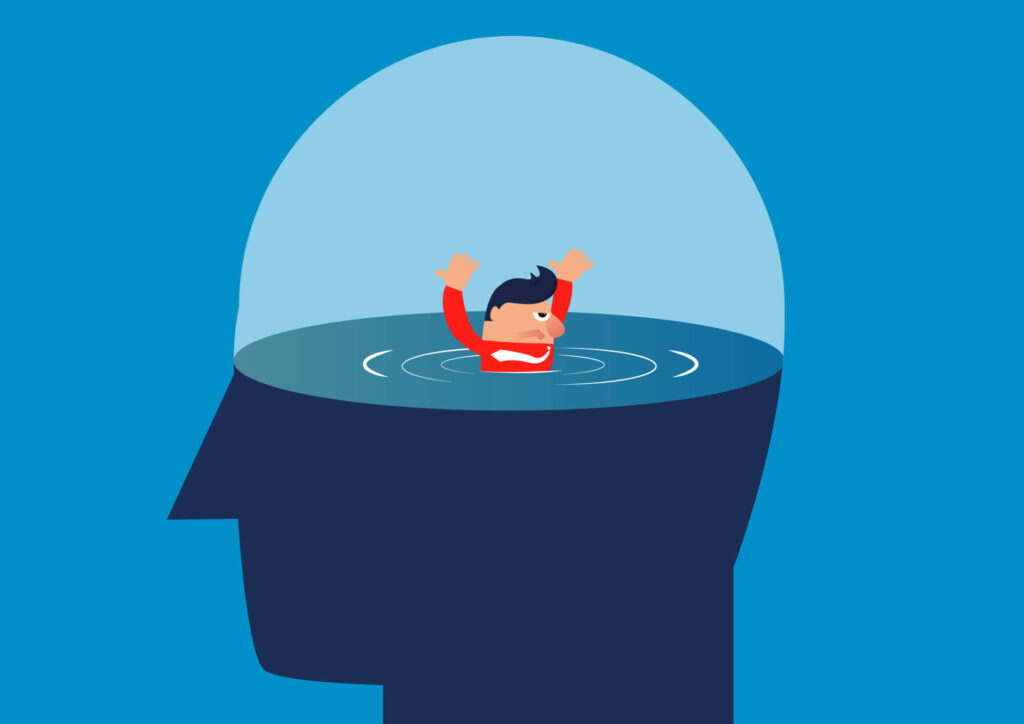Do you feel like you’re having a heart attack? Is your chest tight and are you having trouble breathing? If so, you may be experiencing a panic attack. Panic attacks can be extremely frightening and can seem to come out of nowhere. However, there are things that you can do to stop a panic attack in its tracks. In this blog post, we will discuss what causes panic attacks, how to identify them, and different panic attack treatment options. We will also provide some tips on how to prevent future panic attacks from occurring.
Contents
What Are Panic Attacks?
 Panic attacks are sudden episodes of intense fear that may include chest pain, heart palpitations, shortness of breath, dizziness, or abdominal distress. These attacks often occur for no apparent reason and can be very debilitating.
Panic attacks are sudden episodes of intense fear that may include chest pain, heart palpitations, shortness of breath, dizziness, or abdominal distress. These attacks often occur for no apparent reason and can be very debilitating.
There may be many signs of a panic attack, but some of the most common include:
-sweating
-trembling
-a sense of choking or suffocating
-heart palpitations or chest pain
-nausea or abdominal distress
-feeling dizzy, unsteady, lightheaded, or faint
-sensations of tingling or numbness
-chills or blushing
-fear of losing control or “going crazy”
-fear of dying
Also, there are many causes of panic attacks, some of which may be genetics, chemical imbalances, or even environmental. Whatever the cause, panic attacks can be very frightening and disruptive to your life.
Negative Impacts of Panic Attacks

There are many negative impacts of panic attacks. Panic attacks can cause physical symptoms such as shaking, sweating, chest pain, and shortness of breath. Some of these impacts are:
Avoidant Behavior
One of the main negative impacts of panic attacks is the development of avoidant behavior. This is when a person begins to avoid situations or activities that they fear may trigger a panic attack. In severe cases, people may start to avoid going out in public altogether.
Interference with Daily Life
Another significant negative impact of panic attacks is the interference they can have with daily life. Panic attacks can make it difficult to concentrate at work or school, and can also interfere with social activities and hobbies.
Quality of Life
Panic attacks can negatively impact a person’s quality of life. This is because anxiety and stress can take over a person’s life if they are constantly worrying about having another panic attack. This quality of life also diminishes if a person starts to avoid activities they once enjoyed due to the fear of having a panic attack.
Relationship Issues
Anxiety and panic attacks can also put a strain on relationships. This is because anxiety can make it difficult to communicate with others, and can also lead to avoidance behavior. Sometimes there are also misunderstandings about what is happening when a person has a panic attack.
School or Work Life
Anxiety and panic attacks can also interfere with school or work life. This is because it can be difficult to concentrate when you are feeling anxious, and panic attacks can also happen at any time, which can make it hard to focus on work or studies.
There are many negative impacts of panic attacks, but there are also many ways to treat them. If you or someone you know is struggling with panic attacks, there are plenty of resources available to help.
Is Panic Attack Treatment Available?
 Panic attack treatment is available and it can be very effective. There are several different treatments that can be used to help stop a panic attack in its tracks. The most important thing to remember is that you should never try to tough it out when you are having a panic attack. If you think you might be having a panic attack, the best thing to do is to seek medical help immediately.
Panic attack treatment is available and it can be very effective. There are several different treatments that can be used to help stop a panic attack in its tracks. The most important thing to remember is that you should never try to tough it out when you are having a panic attack. If you think you might be having a panic attack, the best thing to do is to seek medical help immediately.
There are several doctors who are specially trained in the treatment of panic attacks. When you want to contact a doctor about your panic attacks, you should make sure that you find one who has experience in treating this condition. You can ask your family and friends for recommendations or look online for reviews of doctors in your area.
Once you have found a doctor who you feel comfortable with, the next step is to make an appointment. At your appointment, the doctor will likely ask you several questions about your symptoms and how often you have been experiencing them. It is important to be honest with the doctor so that they can properly diagnose your condition.
After the doctor has had a chance to assess your situation, they will likely recommend a course of treatment. There are several different options available when it comes to panic attack treatment. The doctor will work with you to determine the best course of action based on your individual needs.
Different Panic Attack Treatment Options

There are a variety of ways that you can treat panic attacks and hopefully stop them in their tracks. Some people may opt for medication, while others may prefer therapy or a combination of the two. There is no right or wrong answer when it comes to choosing a treatment option, as each person is different and will respond differently to various methods.
Some of these treatment options are:
Medications
One of the most important things to remember when it comes to panic attack treatment is that there is no one-size-fits-all solution. What works for one person may not work for another, so it’s important to work with your doctor to find the right medication or combination of medications for you. Some common medications used to treat panic attacks include:
Selective serotonin reuptake inhibitors (SSRIs)
This medication is commonly used to treat depression, but it can also be effective in treating panic attacks. SSRIs work by increasing levels of serotonin in the brain, which can help to improve mood and reduce anxiety.
Benzodiazepines
This class of medication is typically used for short-term relief of anxiety or Panic Attacks. They work by slowing down the central nervous system, which can help to reduce symptoms such as racing heart rate and trembling.
Serotonin and norepinephrine reuptake inhibitors (SNRIs)
This type of medication is similar to SSRIs, but it works by increasing levels of both serotonin and norepinephrine in the brain. This can help to improve mood and reduce anxiety.
Beta-blockers
Another option for panic attack treatment is beta-blockers. These medications work by blocking the effects of adrenaline, which can help to reduce symptoms such as heart rate and shaking.
Therapy
In addition to medication, therapy can also be an effective treatment option for panic attacks. Some of these treatment options that you may want to consider include:
Cognitive behavioral therapy (CBT)
This type of therapy can help you to identify and change the negative thoughts and beliefs that may be contributing to your panic attacks. CBT can also help you to learn healthy coping mechanisms for dealing with anxiety and Panic Attacks. This CBT helps to break the cycle of negative thinking that can fuel panic attacks.
This type of therapy involves gradually exposing yourself to the things that you’re afraid of or that trigger your panic attacks. This can help you to learn to cope with your fears and may eventually help to reduce the frequency and intensity of your panic attacks.
Relaxation techniques
Learning relaxation techniques, such as deep breathing or progressive muscle relaxation, can also help reduce the symptoms of panic attacks. These techniques can help to calm your mind and body, which may help to prevent or lessen the severity of a panic attack.
Self-Care
An important part of panic attack treatment is self-care. This includes things like getting regular exercise, eating a healthy diet, getting enough sleep, and managing stress. These self-care activities can help to reduce the frequency and intensity of panic attacks.
Support Groups
One final treatment option that you may want to consider is a support group. There are many different types of support groups available, and they can be a great resource for people who suffer from panic attacks. Support groups can provide you with information and resources, as well as a place to share your experiences with others who understand what you’re going through.
No matter what treatment option you choose, it’s important to remember that there is hope. Panic attacks can be frightening, but there are many effective treatments available that can help to reduce their frequency and intensity. With the right treatment plan, you can learn to manage your panic attacks and live a full and healthy life.
Tips To Keep In Mind While Taking Panic Attack Treatment

There are a few things to keep in mind while you are taking panic attack treatment.
- First and foremost, remember that this is a process and it may take some time to see results. Be patient and give the treatment a chance to work.
- Secondly, make sure to keep your doctor or therapist informed of any changes in your symptoms or how you are feeling. This will help them adjust the treatment if necessary.
- Finally, do not hesitate to ask questions if there is anything you do not understand. The more informed you are, the better able you will be to manage your condition.
If you follow these tips, you should be well on your way to managing your panic attacks and living a normal, healthy life.
Conclusion
Panic attacks are a real and serious condition that can be effectively treated. If you or someone you know is experiencing panic attacks, don’t hesitate to reach out for help. With the right treatment, panic attacks can be stopped in their tracks and managed effectively.
If you think you may be having a panic attack, it’s important to seek medical help immediately. Panic attacks can be frightening and overwhelming, but there are treatments available that can help. Don’t suffer in silence – reach out for help today.
Hope this article was of help to you! If you are suffering from panic attacks, you may seek help from Therapy Mantra. We have a team of highly trained and experienced therapists who can provide you with the tools and skills necessary for overcoming panic attacks. Contact us today to schedule an online therapy or download our free Android or iOS app for more information.


